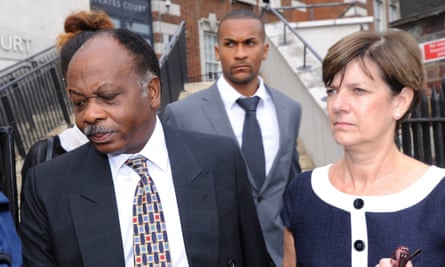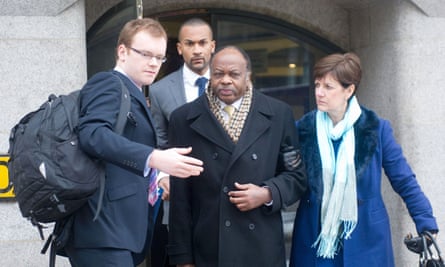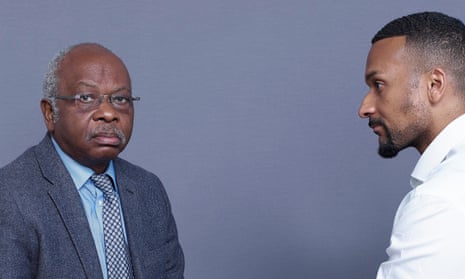It was a winter evening at a hospital just outside London and colorectal surgeon David Sellu’s clinic was busy. But when a fellow doctor, an orthopaedic surgeon, asked him if he would see one of his patients, Sellu didn’t hesitate to say yes. Which is how, an hour or so later, he came to meet the man whose death would turn him into a criminal serving 15 months in a prison cell.
His new patient was a 66-year-old who had recently had a knee replacement, but was now complaining of abdominal pain. In Did He Save Lives?, the book that documents his story, Sellu recalls shaking hands with the man, James Hughes, a retired builder from Northern Ireland, and sitting by his bed to talk about how he was feeling. Sellu, now in his early 70s, speaks quietly and precisely. It’s easy to imagine him on that evening nine years ago, pulling up a chair and explaining to Hughes that he’d need painkillers to get him through the night and an urgent CT scan in the morning.
That scan showed Hughes had a perforated bowel and would need surgery straight away. Sellu tried to book an operating slot, but the earliest he could secure a theatre and anaesthetist at the hospital, the private Clementine Churchill in Harrow, was for later that evening. At the last minute, however, the anaesthetist was delayed with another case. Sellu tried, but failed, to find another anaesthetist. Hughes’s surgery eventually went ahead, but not until around three hours after the intended slot. During the operation Hughes bled a lot more than expected and, it turned out, was also suffering from cirrhosis of the liver. By the time the surgery was over and Hughes was transferred to intensive care, it was clear that he had an uphill battle ahead.

Sadly, it was one he couldn’t win. Hughes died two days later, without ever regaining consciousness. Sellu remembers being told the news by a colleague on the phone. “When something like that happens, you go through a very difficult time. You agonise about whether you could have done anything different – this happens after every death.” More than a third of people who suffer from a perforated bowel die from it in the UK, however good their care. Nevertheless, it at no time occurred to Sellu that he might have caused his patient’s death – or that anyone would imagine he had.
David Sellu’s official birthdate is 22 November 1946, but that almost certainly wasn’t the day he was born. He grew up in a village in a rural part of Sierra Leone, the eldest of 10 children. Neither of his parents could read or write and they expected their son’s life would be like their lives, spent cultivating rice and tending to a small flock of sheep and goats. After he started to teach himself to read, his aunt got him a place in the local school – and on the first day, she and the headteacher chose his birthdate. It didn’t make much difference to Sellu when anyone thought he was born, until 1968 when he needed to apply for a passport.
He’d done remarkably well academically and had won a scholarship to study medicine at Manchester University. He boarded a plane for the first time in his life and arrived in the UK knowing no one. When he realised he’d left his toothbrush at home he headed into a shop near his hostel in London to buy another. The shop was Harrods: an attendant kindly pointed him towards another shop called Boots down the road.
Fast forward four decades and Sellu had risen to become a senior consultant specialising in gastrointestinal and colorectal surgery. He and his wife Catherine, whom he had met when he was a registrar and she was a staff nurse at Hammersmith Hospital, lived with their family in a large, comfortable home in west London. There were four Sellu children and James, the youngest, decided to follow his father into medicine. Today, James is with his father to meet me, and he takes up the story. “We were living a good life,” he says. “We had everything we wanted. I knew my father worked extremely hard – often he’d already be at work when I woke up, and still at work when I went to bed. But I heard my parents discussing their patients and the difference they made to their lives and I found it inspiring. I wanted to do the same with my life.” In the autumn of 2009, James got a place to study medicine at his father’s old university.
Meanwhile, across in Armagh, a builder with a painful leg was already thinking about having a knee replacement in London, a decision that would lead to his own death, but would also have a dramatic effect on the lives of both David Sellu and his son James.
The circumstances of Hughes’s death meant an inquiry was inevitable and Sellu welcomed it. During the course of his career, he says, medicine has become increasingly complex. “You have doctors, nurses, managers, laboratories, protocols,” he explains. “When something goes wrong, you need to look at the whole system.”
Professor Duncan Empey, group medical director of the Churchill Hospital’s parent group BMI, commissioned the report and, to Sellu’s surprise, its two investigators were asked to trawl through his history to see whether he had made mistakes in the past. This, says Sellu, was unfair: put any surgeon’s work under scrutiny and you will always find some instances where things went wrong; equally, any mismanagement should have been dealt with at the time. Either way, Sellu says he was never so much as criticised during his long career.
The Empey report, as it was known, was critical of Sellu and he was summoned to appear before the General Medical Council (GMC) to defend himself against charges that his treatment of Hughes had fallen below the standard expected, to a serious degree; but neither the GMC nor, later on, the inquest or court, were aware of another report, the Root Cause Analysis (RCA), that was commissioned by the hospital to look into its procedures and carried out by its quality manager. Initially, the GMC decided there was no case to answer, but said it would await the outcome of further inquiries including the coroner’s inquest. On a subsequent occasion, when he was summoned again to the GMC, Sellu noticed something troubling: all the other doctors up before the regulators on the day he was there were people, like him, who had foreign names.

It was the inquest into Hughes death, in October 2010, that changed everything. The coroner homed in on the delay in performing surgery and then, all of a sudden, he interrupted proceedings, asked Sellu to step outside, and told Sellu’s counsel and the court that he believed a crime had been committed. This led to a police investigation into whether or not Sellu had done enough to reduce the delays; and it culminated in the consultant being charged, in July 2012, on two counts: gross negligent manslaughter of James Hughes, and perjury in the coroner’s court, which related to answers he had given when he first saw the CT scan report.
For Sellu and his family, the cloud that had been hanging over their lives for the two years since the coroner referred the matter to the police was suddenly a full-blown storm. David and Catherine had done their best to keep how serious things were from their children, which meant that James, at university in Manchester, was shocked when he got the news. He remembers how it felt to be in court, and to see his father in the dock. “I was numb,” he says. “I’d never imagined that we could ever be in that situation.”
The case was tried in October and November 2013: Sellu was found not guilty of the perjury charge, but guilty by a majority of 10 to two – the minimum required to convict – of the manslaughter charge. He was sentenced to two-and-a-half years in prison, and served 15 months – including time in two prisons in Suffolk, many miles from his family, who had to make long journeys across the country to see him. James took breaks from his studies to support his mother and sisters on these trips.
In his book, Sellu describes, movingly, his quiet but determined dignity in appalling conditions. Sharing a cell with two other men for up to 22 hours a day, he says, was like being locked in a toilet with strangers. Recreation, exercise and meaningful work were scarce. To while away the hours he taught himself Arabic and improved his French.
Eventually there were opportunities for home leave and on one such occasion James delivered what David remembers as “a bombshell”. Despite having secured a merit in his master’s degree and completing his medical degree, James had decided to stop his career as a doctor before it had even begun. His father’s eyes fill with tears as he remembers hearing the news. “Catherine and I had always encouraged him, always believed medicine was a wonderful career. We were devastated.”
Sellu was released in February 2015. In November 2016, after a campaign led by a fellow doctor, consultant neurologist Jenny Vaughan, his conviction was overturned by three appeal judges on the grounds the judge had not properly directed the jury. It emerged that in the RCA report the hospital’s identified failings included its lack of an emergency anaesthetic rota. The Medical Practitioners Tribunal Service (MPTS) ruled that it was satisfied Sellu had taken proactive steps to perform surgery and that Hughes’s condition had not significantly deteriorated on the afternoon before the operation. Dr Rob Hendry, medical director at the Medical Protection Society, who represented Mr Sellu, said: “The tribunal heard all of the evidence in this case and tested it rigorously. As we have said before, they are best placed to weigh up all of the factors affecting a doctor’s fitness to practise. By contrast, a criminal court is rarely the best place to hold a doctor to account for what has happened in a complex clinical environment.”
James has not revisited his decision to quit medicine. “When something goes wrong, people look for a scapegoat,” he says. “And if you’re a black doctor, you’re first in line. I loved the idea of being a doctor and impacting positively on other people’s lives, but almost all doctors work in the private sector as well as the NHS, and the NHS needs the private sector to survive. And being a black doctor is just too risky. Also, if you end up in court, as my father did, you find yourself being tried by people who, with all due respect, haven’t got a clue what they’re listening to. At one point during my father’s trial I noticed one of the jurors looking at a piece of evidence upside down.”
James Sellu now has a job in sales. His father – exonerated, cleared by the GMC – is back working part-time. He is “a stronger person” now, he reflects, “and maybe a more compassionate one. But these days I’m very wary. I’ve realised you don’t know who are your friends, and who are your enemies.” He feels what happened to him contains important lessons both for the medical system and about racism, and he wants to highlight how individuals are being made to carry the can for the failures of a complex and under-resourced system.
And yet, remarkably, there’s no hint of anger about him. “When I was in prison I realised this could destroy me,” he says. “I knew I couldn’t allow it to do that. Many doctors who are investigated for alleged negligence take their own lives, and many people in prison take their own lives. I knew I had to look after my psychological health.”
He’ll always be sad about the choice James made, but he understands it. “Having been through what I’d been through, I could see it from James’s point of view. He saw how much I’d sacrificed to be a doctor – and yet I ended up in a prison cell. So yes, I can see why he had second thoughts about following me down the same path.”
Did He Save Lives? A Surgeon’s Story by David Sellu is published by Sweetcroft on 4 July at £9.99
